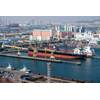Barges Break Free, Hit Starved Rock Dam
The U.S. Coast Guard is working the the U.S. Army Corps of Engineers and the owners of a tug and barges to quickly and safely move two barges that drifted into the protection walls of Starved Rock Lock and Dam in Utica, Illinois, Sunday afternoon.
The Joyce Hale, a 157-foot towing vessel, was pushing eight barges of dry cargo south on the Illinois River when two of the eight barges it was pushing made contact with the protection walls of the Starved Rock Lock and Dam.
As a result of the allision, four of the barges broke away from the vessel's tow wires. The crew immediately notified watchstanders at Coast Guard Sector Lake Michigan in Milwaukee at about 1:15 p.m.
The crew of the Joyce Hale quickly recovered two of the barges but the other two drifted into the protection cells of Starved Rock Lock and Dam. Those two barges contain no hazardous material; one is carrying corn and the other is carrying sand.
The Coast Guard launched a helicopter for a damage assessment flyover and marine inspectors from Marine Safety Unit Chicago to begin an investigation. The Army Corps of Engineers have temporarily closed the lock, but preliminary investigations have not revealed any damage to the lock or barges. There are no reported injuries.
"The Coast Guard, Army Corps of Engineers, American River Transportation Company and LaSalle County Emergency Management Agency are working closely together to ensure and safe and effective response to this incident," said Capt. Amy Cocanour, commander of Coast Guard Sector Lake Michigan. "Our goals are to safely recover the barges and reopen the waterway as soon as possible."
Related News


